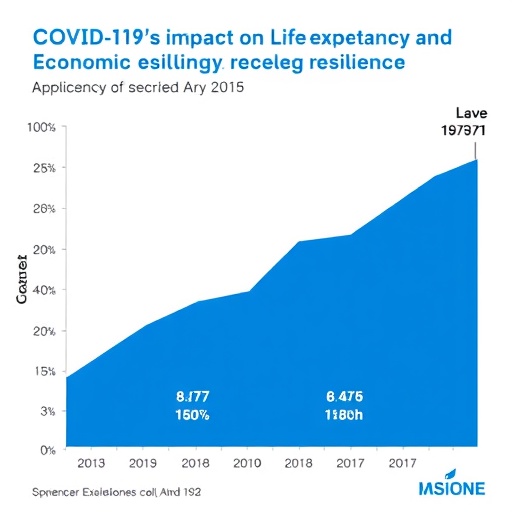The COVID-19 pandemic has profoundly affected various aspects of life globally, with far-reaching impacts on health, economic stability, and social infrastructure. This cataclysm has laid bare the vulnerabilities of resource-constrained economies, compelling nations to reevaluate their priorities in relation to life expectancy, economic growth, and resilience. In a recent study authored by Samadhini, Lakshan, Nirmani, and others, published in the journal Discover Sustainability, a critical analysis of these parameters in the context of the pandemic is presented. The researchers delve into the interplay among life expectancy, economic dynamics, and sustainable development goals (SDGs), shedding light on the urgent need for a more comprehensive approach to policy formulation.
The preliminary findings of the study indicate a stark correlation between life expectancy and economic growth, particularly in nations struggling with limited resources. The authors argue that in these economies, investments in healthcare and social safety nets are not merely altruistic; they are strategic imperatives for sustaining economic progress. When a population’s health is prioritized, it leads to improved productivity, decreased healthcare costs, and ultimately fosters a more robust economic framework. It becomes evident that a healthier populace can significantly contribute to resilience in the face of unexpected adversities like pandemic outbreaks.
Moreover, the paper highlights how the COVID-19 pandemic has served as a stress test for many economies. In regions where prior investments in health infrastructure were insufficient, the pandemic exacerbated existing vulnerabilities. Consequently, the social and economic costs of the crisis were disproportionately borne by the most marginalized groups. This situation amplifies the urgent need for targeted policies that prioritize health access and equity, ensuring that resource-constrained economies can better withstand future shocks.
The authors also place particular emphasis on the role of sustainable development goals (SDGs) as a guiding framework for addressing these multifaceted challenges. The integration of SDGs into national policies is not only critical for immediate recovery efforts but is also essential for laying the groundwork for long-term resilience. By aligning economic growth strategies with SDG objectives, nations can foster both environmental sustainability and social equity, creating a stronger foundation for future prosperity.
In their analysis, the researchers employed a combination of quantitative and qualitative methodologies, providing a comprehensive view of the current landscape in resource-constrained economies. They utilized data analytics to examine the relationship between life expectancy scores and GDP growth rates, revealing statistically significant patterns. In parallel, case studies offered insights into how various countries adapted their healthcare policies and economic strategies in response to the pandemic’s challenges.
Another significant aspect discussed in the article is the role of governance in shaping health and economic outcomes during crises. The authors argue that effective governance structures are foundational for implementing swift and impactful interventions. Countries with transparent decision-making processes and citizen engagement drastically outperformed others in managing the dual crises of health and economic collapse. This reinforces the idea that strengthening governance is an essential step toward building resilience in vulnerable economies.
Furthermore, the study underscores the importance of global cooperation in addressing the far-reaching consequences of the pandemic. The interconnectedness of economies means that the impacts of health crises are not confined to national borders. As such, international collaborations and partnerships are crucial for sharing knowledge, resources, and best practices. By working together, nations can formulate comprehensive strategies that not only mitigate immediate crises but also prepare for future challenges.
The implications of the research extend beyond immediate economic recovery; they call for a paradigm shift in how we conceive of development in resource-constrained settings. It is not enough to focus solely on economic growth; policymakers must incorporate health outcomes into their planning and strategy formulations. The pursuit of economic goals needs to be inextricably linked to the health and well-being of citizens to create sustainable progress.
In conclusion, the findings by Samadhini and colleagues provide a vital roadmap for policymakers addressing the ongoing fallout from the COVID-19 pandemic. They underscore the necessity of viewing health not simply as a public service but as a cornerstone of economic prosperity and resilience. The recommendations set forth in the research advocate for a comprehensive, health-centric approach to development that accounts for the nuances of the current global landscape. The urgency for such an approach has never been more pronounced, as economies around the world strive to navigate the recovery phase while preparing for potential future disruptions.
As we move forward, the lessons learned during the pandemic can best inform future strategies and interventions. The amalgamation of health, economic growth, and sustainability should serve as a blueprint for comprehensive policy-making, ensuring that resource-constrained economies can not only survive but thrive in an uncertain world. It is an essential call to action for leaders across sectors to prioritize resilience, health equity, and sustainability as they embark on the journey toward recovery and growth.
Subject of Research: The interplay of life expectancy, economic growth, and resilience in resource-constrained economies amidst COVID-19.
Article Title: Life expectancy economic growth and resilience in resource constrained economies in the context of COVID-19 and the sustainable development goals.
Article References: Samadhini, D., Lakshan, P., Nirmani, P. et al. Life expectancy economic growth and resilience in resource constrained economies in the context of COVID-19 and the sustainable development goals. Discov Sustain 6, 1236 (2025). https://doi.org/10.1007/s43621-025-02074-z
Image Credits: AI Generated
DOI: https://doi.org/10.1007/s43621-025-02074-z
Keywords: COVID-19, life expectancy, economic growth, resilience, sustainable development goals, resource-constrained economies.




